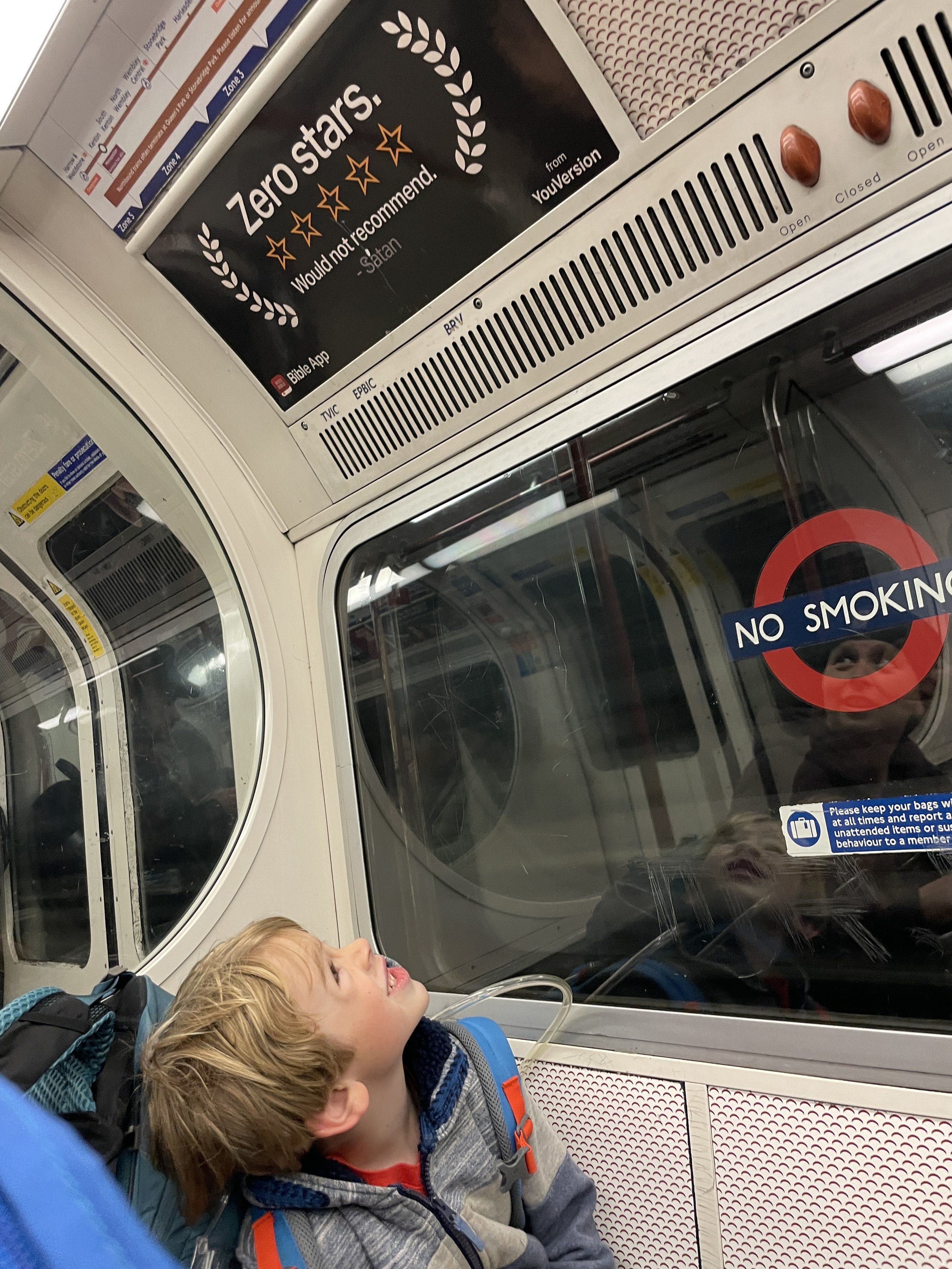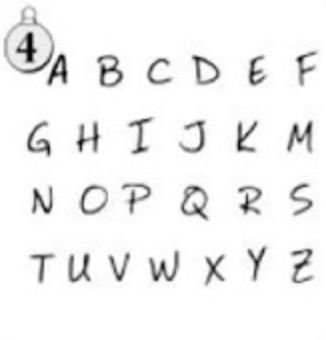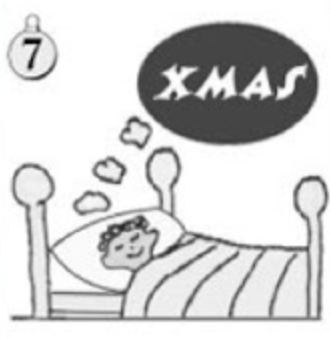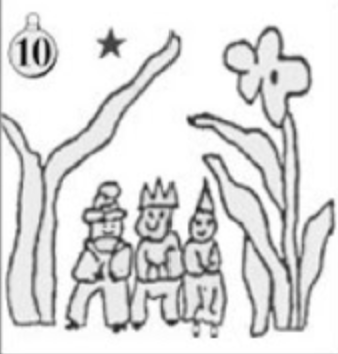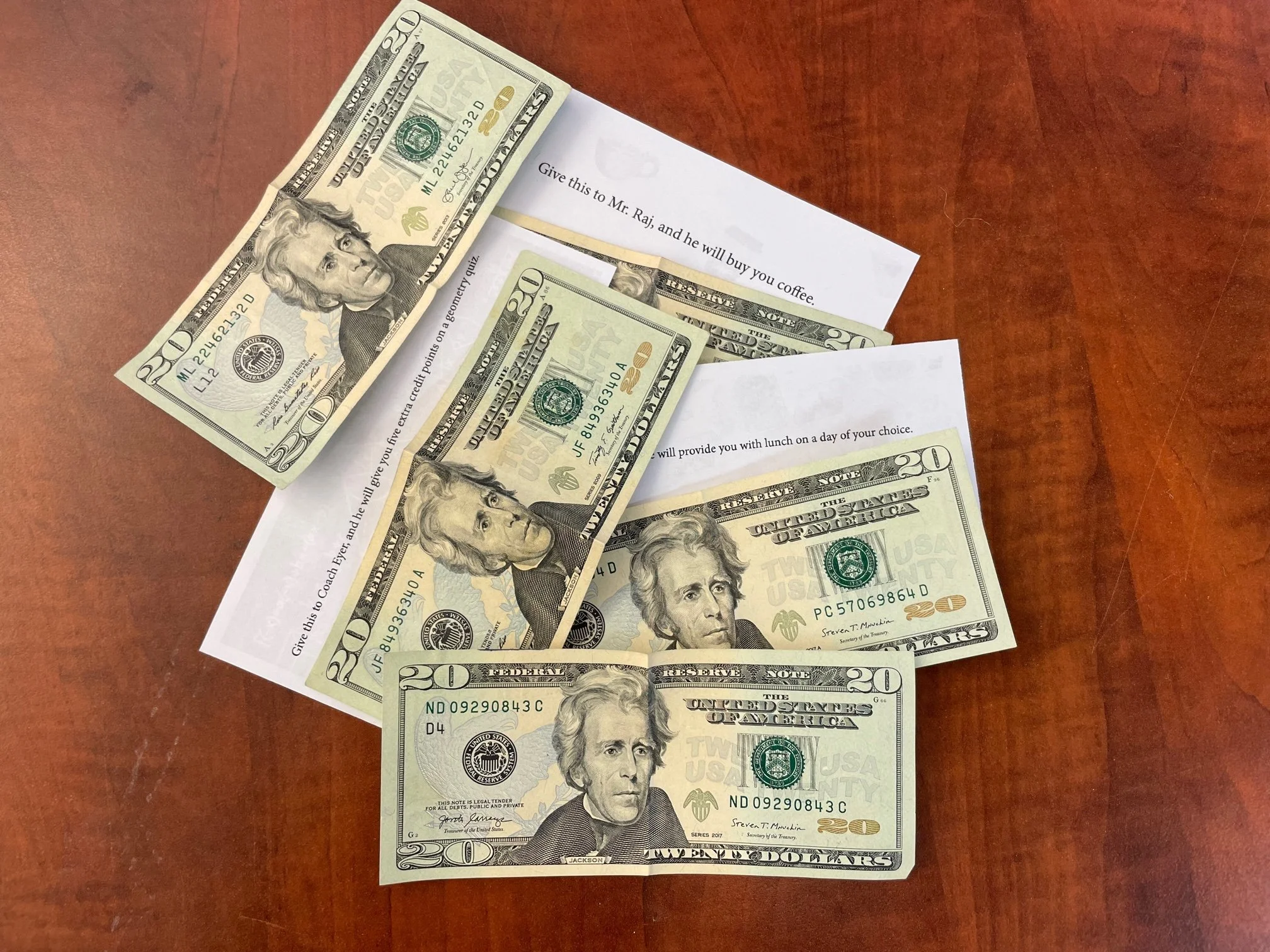May 20–24
I know many of you have found that consistent studying—which you are engaged in right now for finals—more often than not results in successful grades.
STUDY to GRADE word ladder
Beginning with the word STUDY, change one letter at a time—always forming a valid word each time you change a letter—until you form the word GRADE.
Example: DOG to CAT
DOG > DOT > COT > CAT
Just a reminder: It is very easy to do a Google search for something like “word ladder solver” and find tools that use the power of computers and large databases of words to solve word ladder puzzles almost instantaneously. I trust that you won’t use one of those, since that would go against the spirit of this wordplay challenge.
May 13–17
To earn the extra credit for this week, turn in a screenshot showing that you have won a round of this word game. You may choose the “play computer” option, but wouldn’t “play with friends” be more fun?
May 6–10
We’ve featured crosswords, spiral puzzles, and a few other word puzzles that commonly appear in print as PAA weekly wordplays, but never before this sort: The acrostic puzzle.
Here’s an example that we’ll use to demonstrate how they work in class.
To earn the extra credit, solve this acrostic puzzle.
April 29–May 3
A friend introduced me to another of the New York Times word puzzles. This one is called Strands. Solve today’s puzzle as an example.
You can also create custom Strands puzzles here.
To earn the extra credit, solve this PAA-related Strands puzzle and turn in a screenshot to prove it.
April 22–26
April 22, (the Monday on which this Weekly Wordplay is released) is Earth Day. Earth, as you may know is one of the planets of our Solar System.
A mnemonic device is a method used to commit information to memory. Until 2006, when Pluto was demoted from planet to “dwarf planet” by the International Astronomical Union, a common mnemonic device for remembering the names of the planets was the odd sentence, “My very educated mother just served us nine pizzas,” in which each word starts with the same letter as the planets’ names, moving outward from the sun: Mercury, Venus, Earth, Mars, Jupiter, Saturn, Uranus, Neptune, Pluto. Most people find it easier to remember a quirky sentence than a list of nine planet names.
To earn the extra credit, come up with an original mnemonic phrase like the example above. Choose some information that you think is useful to remember (besides the names of the planets), and develop a phrase to help you (and the rest of us) remember it.
April 15-19
My daughter is reading a book in which each chapter starts with a humorous haiku.
Traditionally, haiku are about nature and include a reference to a specific season.
We’re a bit less than a month into spring. To earn the extra credit, write a haiku that is in some way connected with spring.
Recall that in English, haiku are three-line poems with five syllables in the first line, seven syllables in the second line, and five syllables in the third line.
April 22–26
April 22, (the Monday on which this Weekly Wordplay is released) is Earth Day. Earth, as you may know is one of the planets of our Solar System.
A mnemonic device is a method used to commit information to memory. Until 2006, when Pluto was demoted from planet to “dwarf planet” by the International Astronomical Union, a common mnemonic device for remembering the names of the planets was the odd sentence, “My very educated mother just served us nine pizzas,” in which each word starts with the same letter as the planets’ names, moving outward from the sun: Mercury, Venus, Earth, Mars, Jupiter, Saturn, Uranus, Neptune, Pluto. Most people find it easier to remember a quirky sentence than a list of nine planet names.
To earn the extra credit, come up with an original mnemonic phrase like the example above. Choose some information that you think is useful to remember (besides the names of the planets), and develop a phrase to help you (and the rest of us) remember it.
April 8–12
Some languages have highly consistent spelling. In these languages, if you know how to speak a word, you know how to spell it. English is definitely not that way.
Here’s one way of illustrating English’s inconsistent spelling system that I enjoy:
Consider the word “ghoti”
The gh is pronounced like the gh in tough.
The o is pronounced like the o in women.
The ti is pronounced like the ti in nation.
Therefore, “ghoti” is pronounced “fish.”
To earn the extra credit, form a word like “ghoti,” creating an unexpected spelling for a common word using combinations of letters as they are pronounced in various other words.
April 1–5
During each year of high school English, we discuss methods of persuasion at least briefly. One of the methods we discuss is an appeal to ethos or an appeal to authority. If we have respect for the person who says something or believe him or her to be an authority on a subject, we are more likely to be persuaded to agree with what he or she says.
During spring break, I saw an advertisement that I thought was a creative inversion of this persuasive principle:
Inspired by this image, create an imaginary advertisement using at least text, but also an image if you want, that uses an endorsement or condemnation by someone the viewers would not respect as an authority to encourage them to do the opposite of what is being suggested.
March 18–22
To earn the extra credit, solve this Connections puzzle and submit a screenshot to prove it.
March 11-15
This last weekend, because of Daylight Saving Time, we lost one hour of sleep (or at least it felt like it, since official time sprang forward to one hour later). My sleep was shorter than normal.
SLEEP to SHORT word ladder
Beginning with the word SLEEP, change one letter at a time—always forming a valid word each time you change a letter—until you form the word SHORT.
Example: DOG to CAT
DOG > DOT > COT > CAT
Just a reminder: It is very easy to do a Google search for something like “word ladder solver” and find tools that use the power of computers and large databases of words to solve word ladder puzzles almost instantaneously. I trust that you won’t use one of those, since that would go against the spirit of this wordplay challenge.
March 4–8
Correctly complete this mini-crossword to earn the extra credit.
February 26–March 1
Complete this word pyramid to earn the extra credit.
February 19–23
We just had a long weekend because of Presidents’ Day. The president leads the executive branch of the federal government, and in connection with that role, let’s consider the names of some of the executive departments. Currently, there are 15, the Departments of…
State
Treasury
Interior
Agriculture
Justice
Commerce
Labor
Defense
Health and Human Services
Housing and Urban Development
Transportation
Energy
Education
Veterans Affairs
Homeland Security
Some departments are relatively new—Homeland Security was created in 2002, for example—and some have been around since just after the constitution was ratified. The Department of War was one of those established a few months into George Washington’s first term. Its name, however was changed to the Department of Defense in 1947. The home page of the Department of Defense website alludes to the reason for that renaming.
Similarly, Health and Human Services used to be “Health, Education, and Welfare.” Education got its own department, and the word “Welfare,” with its connotations that some people dislike, was avoided.
Research what the various departments do, and then propose a name change for one of them. Your proposed new name could better reflect what that department actually does, or it could reflect what think the federal government ought to be doing in that policy area. Explain the reasoning for your suggested name change.
February 12–16
Many authors write under “pen names”—pseudonyms they’ve chosen to be the names attached to their writing for various reasons.
If you were publishing a book and couldn’t use your usual name, what would your pen name be? To earn the extra credit, choose a pen name, and explain why you might use it. Any reasoning that is more interesting than, “It’s the first name that came to mind, and I want the extra credit” will be acceptable.
February 5–9
A piece of writing is univocalic if it uses only one of the vowels. There are univocalic poems, stories, and even full-length novels.
Here’s is a portion of the ten commandments rewritten as a univocalic in O:
10 most common protocols of God:
1. God controls world solo.
2. Do not concoct own dolls, nor do bow to wrong gods of gold.
3. God’s honor’s worth lots, do not mock God.
4. Yom of God’s yom of God, son.
5. Honor own mom, mom’s consort too.
6. Do not knock off folks.
…
Your constraints for the extra credit task are twice as flexible as a univocalic. To earn the extra credit, write something (a poem, a very short story, a love letter—whatever you choose) that is bivocalic. Choose two vowels, and only use those two in your writing.
January 29–February 2
Try Flashback, the weekly history quiz from the New York Times. You begin with one historical event, described in one or two well written sentences. Then you’re given eight more events, one-by-one, and you attempt to form a timeline with them, placing them in correct sequence with the events already there.
The NYT also invites readers to submit events for next week’s Flashback quiz. To earn the extra credit, consider the way the event descriptions are written in the published Flashback quiz. For example, we don’t read “Return of the Jedi is released,” but instead, “Named partly for a Native tribe, Ewoks debut in Return of the Jedi. They’ll inspire a 5-year-old, Lily Gladstone, to become an actor.” Then, create a Flashback game (one initial event with the date given, and eight additional events for players to place in order) with event descriptions of similar style and quality. Submit all of your events on Google Classroom, and we’ll play some of the Flashback quizzes you created in class next Monday. Also submit them at the NYT page linked above, and we’ll see if any of them get published.
January 22–26
Fill in this crossword with all the correct answers to earn the extra credit for this week.
After you fill in the grid with all the correct answers and earn the extra credit, there is an additional metapuzzle to solve. When you think you’ve found the metapuzzle answer, enter it here to learn the location of a container that is hidden somewhere on campus containing these treasures:
Five $20 bills
A ticket for one lunch provided by Mrs. Taylor
A ticket from Ms. Maas to skip one Quick Check
A ticket to from Coach Eyer to skip one mile run
January 15–19
Complete this word pyramid to earn the extra credit.
January 8–12
This is the last week of first semester. We are about to move from semester one to semester two.
ONE to TWO word ladder
Beginning with the word ONE, change one letter at a time—always forming a valid word each time you change a letter—until you form the word TWO.
Example: DOG to CAT
DOG > DOT > COT > CAT
Just a reminder: It is very easy to do a Google search for something like “word ladder solver” and find tools that use the power of computers and large databases of words to solve word ladder puzzles almost instantaneously. I trust that you won’t use one of those, since that would go against the spirit of this wordplay challenge.
January 1–5
In an acrostic poem, the first letter of each line spells out a word or phrase, or sometimes each successive line begins with the next letter of the alphabet.
Consider Psalm 119 and the book of Lamentations from the Bible.
To earn the extra credit, write an acrostic poem that is connected with the new year. For example, you could write a poem in which the first letter of each line spells out…
N
E
W
Y
E
A
R
…or your poem could spell out a New Year’s resolution you’ve made.
December 11–15
I was introduced to a new sort of word puzzle last week by a student. It's called "Connections." The New York Times puts out one each day, and I've adapted the instructions they give:
Find groups of four items that share something in common.
Select four items and choose "Submit" to check if your guess is correct.
Category examples:
MUSICAL INSTRUMENTS: Flute, Drum, Piano, Violin
GREEN ___ : Light, Beret, Lantern, Thumb
Categories are more specific than "5-LETTER WORDS," "NAMES," or "VERBS."
The puzzle has exactly one solution. Watch out for words that seem to belong to multiple categories!
To earn the extra credit, solve this Connections puzzle and submit a screenshot to prove it.
December 4–8
Complete this word pyramid to earn the extra credit.
November 27–December 1
It’s after Thanksgiving, the time when many people feel it’s ok to begin playing Christmas music.
The three images below are rebus puzzles—a type of wordplay puzzle where pictures, symbols, and individual letters clue a word or phrase. Each of these three rebus puzzles represents a Christmas song.
To earn the extra credit, create an original rebus puzzle of your own that clues a Christmas song. Next Monday, we’ll enjoy attempting to figure out out the rebus puzzles that have been turned in.
November 13–17
Fill in this crossword with all the correct answers to earn the extra credit for this week.
After you fill in the grid with all the correct answers and earn the extra credit, there is an additional metapuzzle to solve. When you think you’ve found the metapuzzle answer, enter it here (link no longer active) to learn the location of a container that is hidden somewhere on campus containing the treasures pictured below.
November 6–10
I enjoyed the Paradise Symphony Orchestra concert yesterday afternoon, which featured Ethan Simandan, Ethan Kitto, and Mrs. Unterseher. I’ve been thinking about music, so this is a music-connected wordplay.
Musical notes are usually labeled A, B, C, D, E, F and G. To earn the extra credit, form a word of at least four letters that uses only those letters and turn in a recording yourself playing the sequence of notes that form the word on a musical instrument. An audio recording is fine, but a video recording would be even better.
Composers from at least the time of Johann Sebastian Bach have been hiding their names in their music this way: https://www.kusc.org/culture/arts-alive-blog/musical-cryptograms/
October 30–November 3
I enjoyed the Fall Festival yesterday, and I saw a lot of other people having fun too. There was definitely some tasty food, and I’m pretty sure that TASTY food made some MONEY for your classes.
TASTY to MONEY word ladder
Beginning with the word TASTY, change one letter at a time—always forming a valid word each time you change a letter—until you form the word MONEY.
Example: DOG to CAT
DOG > DOT > COT > CAT
Just a reminder: It is very easy to do a Google search for something like “word ladder solver” and find tools that use the power of computers and large databases of words to solve word ladder puzzles almost instantaneously. I trust that you won’t use one of those, since that would go against the spirit of this wordplay challenge.
October 23–27
To earn the extra credit, give the next three terms in this sequence:
3, 3, 5, 4, 4, 3, 5, 5, 4 . . .
Note: You could probably search for an answer to this one on the internet, because I’m probably not the first person to come up with this puzzle, but use only your brain. No outside resources are necessary or allowed this week.
October 16–20
Correctly complete this mini-crossword to earn the extra credit.
October 9–13
Solve this Wordle-like puzzle. The answer is the name of a PAA student. Turn in a screenshot attached to the Weekly Wordplay assignment on Google Classroom to earn the extra credit.
October 2–6
Most of the school departs this week on the Walla Walla tournament trip. To our soccer and volleyball teams: Have fun, and represent us well through how you treat your opponents. In honor of the sports tournaments, here is a sports-themed weekly wordplay challenge:
Sports teams get their names a variety of ways—sometimes team owners pick a name, sometimes a committee decides, sometimes there’s a contest where local fans suggest names—but a team’s name often has a connection with the location where the team plays. The most literary of sports team names is probably the Baltimore Ravens, named in reference to the poem by American writer Edgar Allan Poe.
To earn the extra credit, imagine that an expansion team is being added to a sports league of your choosing. Pick a place where the team would play their home games, and come up with an appropriate name for the team.
Sidenote: I am amused by alternative division structures for sports leagues such as this one, where the divisions would be based on team names rather than geography. (Sidenote to the sidenote: The team names in the link above are outdated, since the Washington football team changed their name to the Commanders. They may still fit in the Regional Fighting Men Division, though.)
September 25–29
Consider works of literature in which the ending of one title is the same as the beginning of the other. For example, Sleeping Beauty ends the same way Beauty and the Beast begins. The two titles could be linked together and written as Sleeping Beauty and the Beast. Now imagine the plot of a book with that title—with the the plots of the two mixed together into something like, “A princess who’s been put into a supernatural sleep is awakened by a prince who’s been transformed into a hideous monster.”
To earn the extra credit, figure out the two works of literature these plot descriptions might describe, and give the linked-together title for the mixed-together plot:
On one of his many adventures, a boy who inexplicably looks like a mouse meets four sisters—Meg, Jo, Beth, and Amy—and they together prepare for adulthood.
Chinese military strategist Sun Tzu advises families of Russian Aristocrats—the Bezukhovs, Bolkonskys, Rostovs, Kuragins, and Drubetskoys—during the Napoleonic Wars.
Sam-I-Am attempts to convince the prince of Denmark to take revenge on his uncle using some oddly colored food.
September 18–22
The seniors are going to go see two Shakespeare plays on Thursday. Reading the text of a play is quite different from seeing a play performed live.
TEXT to PLAY word ladder
Beginning with the word TEXT, change one letter at a time—always forming a valid word each time you change a letter—until you form the word PLAY
Example: DOG to CAT
DOG > DOT > COT > CAT
Just a reminder: It is very easy to do a Google search for something like “word ladder solver” and find tools that use the power of computers and large databases of words to solve word ladder puzzles almost instantaneously. I trust that you won’t use one of those, since that would go against the spirit of this wordplay challenge.
September 11–15
Consider the first and last initials of the people in our PAA community. For example, our principal’s first and last initials are DB, and the first and last initials of the freshman class president are LO.
Some of these initials could be combined to form words. For example, Sam Chastain and Angel Navarro’s initials could be combined to form the word SCAN.
To earn the extra credit, figure out whose initials can be used to form the following:
The four-letter first name of a member of the PAA community.
A four-letter verb that names something the person referred to above can do well.
A six-letter synonym for the word “follows.”
September 4–8
To earn the extra credit, solve the cryptogram below. Each letter in the original quote has been consistently replaced with another letter of the alphabet, and any digits (1, 2, 3, 4, 5, 6, 7, 8, 9, 0) have been consistently replaced with another digit.
While a Google search would show you numerous cryptogram solvers that use the unique features of computers to try millions of different solutions per second to decrypt a message instantly, please do not use that method. That would go against the spirit of this challenge. Use manual solving techniques only. Hint: T = D
"NPH J CDPY AFS QRGDL J FGES NPH UPI,” TSMRGHSL AFS RPHT, “QRGDL AP QHPLQSH UPI GDT DPA AP FGHO UPI, QRGDL AP BJES UPI FPQS GDT G NIAIHS."
—XSHSOJGF 75:22
August 28–September 1
To earn the extra credit, solve this word spiral puzzle.
August 21–25
What unusual characteristic do these odd phrases have in common?
CHARITY ALIENS
ARCHAIC HINTS
REV NEARBY
LONGEST GRIN
INSOMNIA RENEWAL
To earn the extra credit, explain what unusual characteristic the phrases have in common and give an additional phrase that also has this unusual characteristic.
